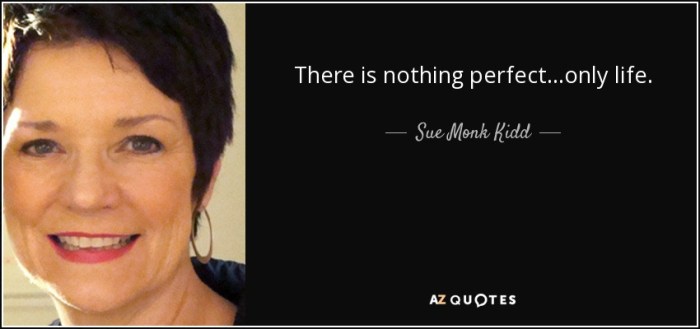In the realm of human existence, there exists a profound truth that has been echoed throughout the ages: there is nothing perfect only life. This concept, while seemingly simple, holds immense significance and invites us to embark on a journey of self-discovery, acceptance, and ultimately, liberation.
As we delve into the intricacies of this idea, we will explore the inherent imperfections that permeate every aspect of life, from the grand tapestry of nature to the intimate workings of our own hearts. We will examine the ways in which these imperfections contribute to the richness and diversity of our experiences, fostering personal growth, resilience, and a deeper appreciation for the beauty that lies within the flawed.
Imperfect Nature of Life

Life is inherently imperfect, characterized by a tapestry of flaws, limitations, and contradictions. These imperfections, far from diminishing its value, contribute to the richness and diversity of existence.
Embracing imperfections allows us to recognize the beauty in the flawed, appreciate the lessons learned from setbacks, and cultivate resilience in the face of adversity.
Pursuit of Perfectionism, There is nothing perfect only life
Striving for perfection can be a relentless pursuit that hinders creativity, innovation, and happiness. It can lead to self-criticism, anxiety, and a fear of failure that stifles personal growth.
Overcoming perfectionist tendencies requires a shift in mindset, fostering a more realistic and balanced approach to life that values progress over perfection.
Acceptance of Imperfections
Accepting life’s imperfections is crucial for emotional well-being and personal fulfillment. Self-compassion and gratitude enable us to appreciate the beauty in the flawed, recognizing that imperfections are an integral part of the human experience.
By embracing our imperfections, we cultivate resilience, reduce self-criticism, and find contentment in the present moment.
The Beauty of Imperfection
Imperfections bring a unique charm and character to life. They add depth, meaning, and authenticity to our experiences.
From the cracks in pottery to the scars on our bodies, imperfections tell stories of resilience, growth, and the passage of time.
| Nature | Art | Human Relationships |
|---|---|---|
| A gnarled tree with twisted branches | A painting with visible brushstrokes | A couple who embraces their differences |
| A misshapen rock with vibrant colors | A sculpture with rough edges | A friendship that has weathered challenges |
Imperfection as a Source of Growth
Embracing imperfections fosters personal and collective growth. Learning from our mistakes and setbacks develops resilience, adaptability, and wisdom.
Imperfections can serve as catalysts for innovation, social progress, and artistic masterpieces.
Embracing Imperfection in Relationships
Perfectionism can damage relationships by creating unrealistic expectations and fostering a fear of being judged. It hinders intimacy and connection.
Healthy relationships embrace imperfections, celebrate diversity, and focus on the qualities that make each individual unique.
Imperfection in Art and Creativity
Imperfection plays a vital role in the creative process. Embracing imperfections allows artists to create more authentic, expressive, and meaningful works of art.
From the unfinished brushstrokes in a painting to the imperfections in a handmade ceramic piece, these flaws add depth and character to the artwork.
Questions and Answers: There Is Nothing Perfect Only Life
What is the main message of “There Is Nothing Perfect Only Life”?
The main message is that life is inherently imperfect, and that embracing these imperfections can lead to personal growth, resilience, and fulfillment.
How does perfectionism hinder creativity and innovation?
Perfectionism can hinder creativity and innovation by creating a fear of failure and a reluctance to take risks.
What are some practical tips for fostering healthy relationships that embrace imperfections?
Some practical tips include setting realistic expectations, practicing active listening, and focusing on building a strong emotional connection.
